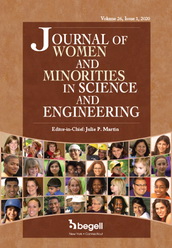
年間 6 号発行
ISSN 印刷: 1072-8325
ISSN オンライン: 1940-431X
Indexed in
ADVANCING WOMEN SCIENTISTS: EXPLORING A THEORETICALLY GROUNDED CLIMATE CHANGE WORKSHOP MODEL
 Get access
Get access
要約
Universities in the United States have an increasing need to recruit the best and the brightest faculty to remain globally competitive, but the majority of schools share a profile that includes a low percentage of women in most of the science, technology, engineering, and math (STEM) disciplines. Changes in university culture are needed to enable departmental diversity growth, to expand offerings and perspectives, and to strengthen the view that STEM is an attractive choice for female students and prospective faculty. This paper describes the theoretical models used to develop a prototype workshop series implemented in departments to help faculty progress in their readiness to advance women scientists, defined as collaborating, mentoring, sharing resources, and generating support through community. The three theoretical underpinnings are the gender-as-structure theory of organizational change, Appreciative Inquiry, and the Transtheoretical Model. These workshops are one aspect of the climate change efforts implemented by the ADVANCE program of the University of Rhode Island.
-
Harlow Lisa L., Duerr Sunny R., Multivariate Analysis of Variance, in Handbook of Quantitative Methods for Educational Research, 2013. Crossref